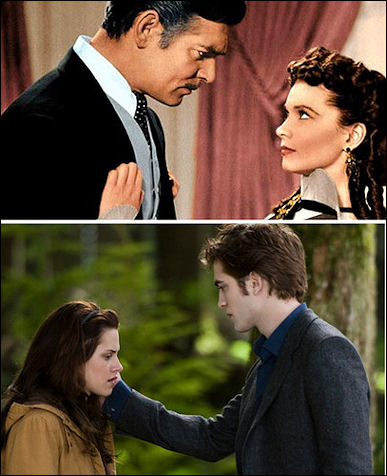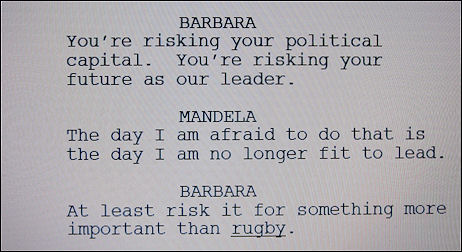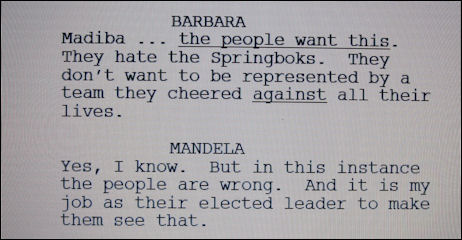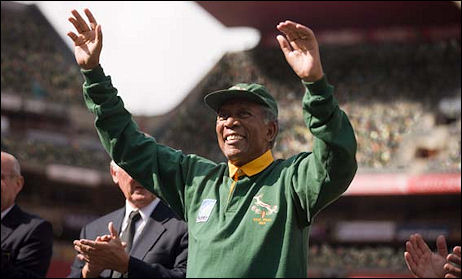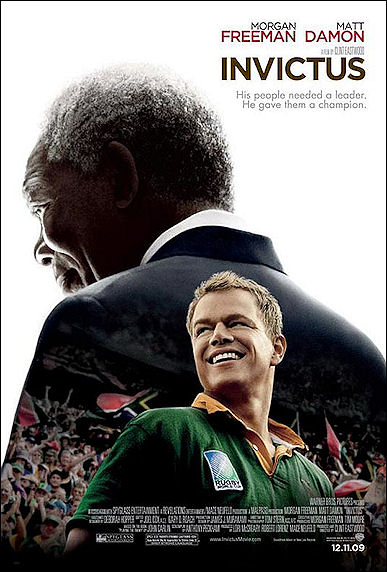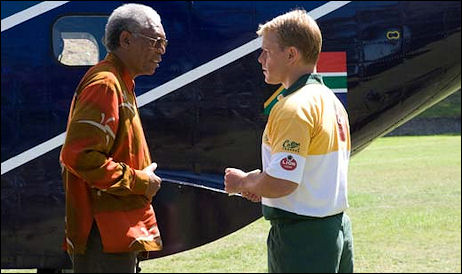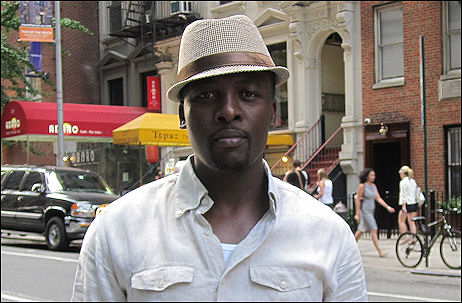“Invictus is a very good story very well told,” writes Variety‘s Todd McCarthy. Wait a minute…a “good story”? The use of this term at the beginning of an important review of an end-of-the-year film by a major director calls for a full examination of its meaning.
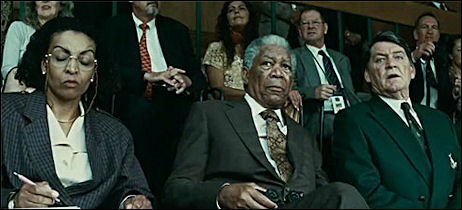
Morgan Freeman (center) as Nelson Mandela in Clint Eastwood’s
Invictus.
I’ve seen Invictus myself and on a certain level McCarthy is right. The story of South African president Nelson Mandela (Morgan Freeman) using the symbolism of sport — i.e., urging unanimous and fervent support of the all-white Springboks rugby team in their goal of winning the 1995 World Cup championship — to unify his racially divided nation is, if you’re at peace with director Clint Eastwood‘s even-tempered, mild-minded shooting style, “well told.” I’m just not sure about the material.
To me the term “good story” is synonymous with “good yarn” — a tale that intrigues and enthralls by…well, usually by planting seeds in the beginning that germinate and sprout into a full and satisfying finale — one that feels natural and true and has a good kick or payoff. We all have our definitions for what “full” and “satisfying” means, but I suspect that what McCarthy meant when he said “good story” is one that is about goodness, or one that is “good” to hear and consider because it says “good” things about human nature, especially when a “good” man finds the strength to lead people in the direction of goodness, which is to say forgiveness and a “thumbs up” attitude that echoes Bob Dylan by saying “don’t look back.”
That aside, McCarthy steps back and, in my view, doesn’t full engage with Invictus, certainly not as much as he could if he wanted to. What is in play here is a justified respect for and allegiance to Eastwood, and McCarthy writing about the film in the same settled-down, measured, and un-throttled way that Eastwood deals with Mandela’s rugby story.
Eastwood’s film, says McCarthy, “has a predictable trajectory, but every scene brims with surprising details that accumulate into a rich fabric of history, cultural impressions and emotion.
“Once again in his extraordinary late-career run, Eastwood surprises with his choice of subject matter, here joining a project Freeman had long hoped to realize. In fact, the filmmaker has frequently dealt with racial issues in a conspicuously even-handed manner, most notably in Bird, and hiscalm, equitable, fair-minded directorial temperament dovetails beautifully with that of Mandela, much of whose daily job as depicted here consisted of modifying and confounding the more extreme views of many of his countrymen on both side of the racial divide.
“Mandela is the lynchpin of Invictus, whose title is Latin for “unconquerable” and comes from a stirring 1875 poem by British writer William Ernest Henley. Although far from a conventional biography, Anthony Peckham’s adaptation of John Carlin‘s densely packed book Playing the Enemy commences with Mandela’s extraordinary transition from imprisonment to the leadership of a country that easily could have fallen into a devastating civil war.
“As he takes office, Mandela allows that his greatest challenge will be successfully relaxing the tension between black aspirations and white fears. Pic adroitly avoids becoming mired in the minutiae of political score-settling by summing up racial suspicions through the prism of the new president’s security detail. Mandela’s longtime black bodyguards are shocked when their ‘Comrade President’ forces them to work with some intimidating Afrikaners, experienced toughs who until very recently were no doubt striking terror into the hearts of the black population.
“Directed by Eastwood with straightforward confidence, the film is marbled with innumerable instances of Mandela disarming his presumed opponents while giving pause to those among his natural constituency who might be looking for some payback rather than intelligent restraint.
“Freeman, a beautiful fit for the part even if he doesn’t go all the way with the accent, takes a little while to shake off the man’s saintlike image, and admittedly, the role of such a hallowed contemporary figure does not invite too much complexity, inner exploration or actorly elaboration. That said, Freeman is a constant delight; gradually, one comes to grasp Mandela’s political calculations, certitudes and risks, the troubled personal life he keeps mostly out of sight, and his extraordinary talent for bringing people around to his point of view.
“Where the rugby match is concerned, that talent is manifested by how, over tea, Mandela personally appeals to the captain of the South African team, the Springboks. A blond Afrikaner with no discernible politics, Francois Pienaar (Matt Damon) would just like to lift the squad from its present mediocrity. But Mandela quotes inspiringly from the poem — ‘I am the master of my fate: I am the captain of my soul’ — speaks of leading by example and exceeding expectations, and leaves Pienaar astonished at the idea that they can dare to dream about winning the World Cup.
“Just as it’s disinclined to offer a primer on South African politics, the film refrains from outlining the rules of rugby; the viewer just has to jump in and surmise that it’s something like a cross between soccer and American football. What the film conveys with tart economy is that rugby was a white game, scorned by blacks; as one man puts it, ‘Soccer is a gentleman’s game played by hooligans, rugby is a hooligan’s game played by gentlemen.’
“In a magnificent irony, the team the mostly white South African squad ultimately faces in the title match is a mostly white New Zealand team called (because of their uniforms) the All Blacks. The climactic faceoff, played in front of 62,000 fans at Johannesburg’s Ellis Park Stadium roused by the presence of Mandela himself, lasts 18 minutes of screen time; when such an event plays out like this in real life, it’s often exclaimed that it could only have been scripted for the movies. Here, it’s real life dictating the incredible scenario.
“With the exception of the meeting with Mandela and a couple of family scenes, most of Damon’s screen time is spent in training or on the field, and it’s meant as highest praise to say that, if he weren’t a recognizable film star, you’d never think he were anything other than a South African rugby player. Beefed up a bit (or, perhaps more accurately, slimmed down somewhat from “The Informant!”) and employing, at least to an outsider’s ear, an impeccable accent, Damon blends in beautifully with his fellow players.
“Some of the most amusing and telling scenes throughout involve the bodyguards, whose body language, facial expressions and intonations of minimal lines convey much about the uncertain state of things in the country.
“Shot entirely on location in South Africa, Invictus looks so natural and realistic that it will strike no one as a film dependent upon CGI and visual effects. In fact, the climactic match would not have been possible without them, as virtually the entire crowd was digitally added after the action was filmed in an empty stadium. You really can’t tell.”
McCarthy is right again — Invictus has the best fake multitudes sitting in a stadium CG I’ve ever seen. Very impressive. Cheers to special effects supervisor Cordell McQueen and visual effects coordinator Eva Abramycheva.


